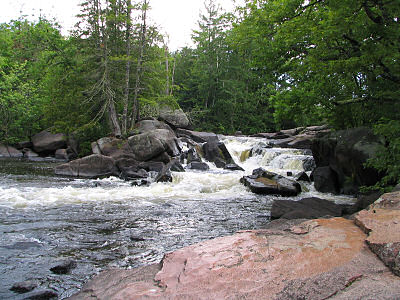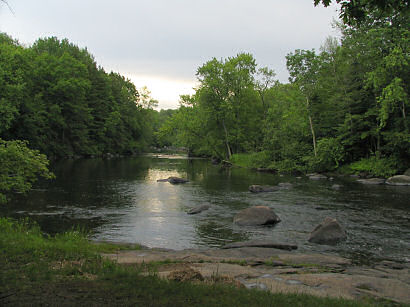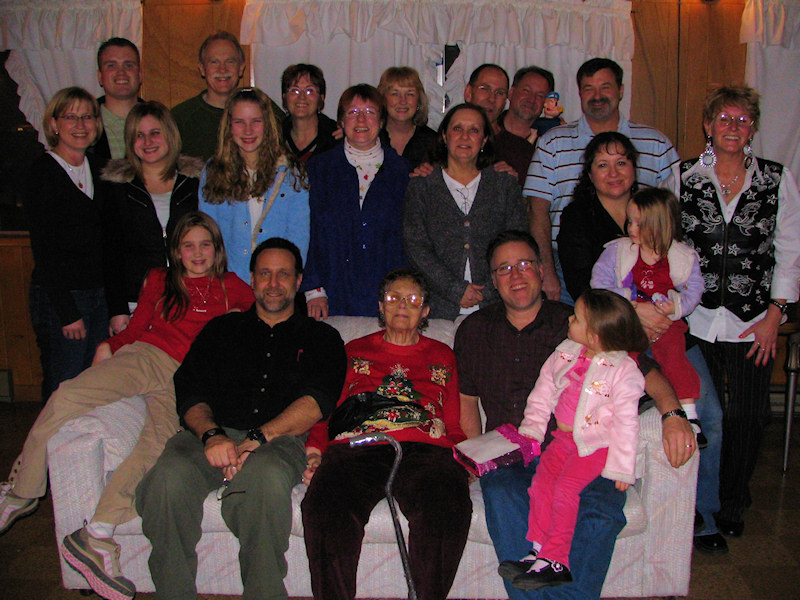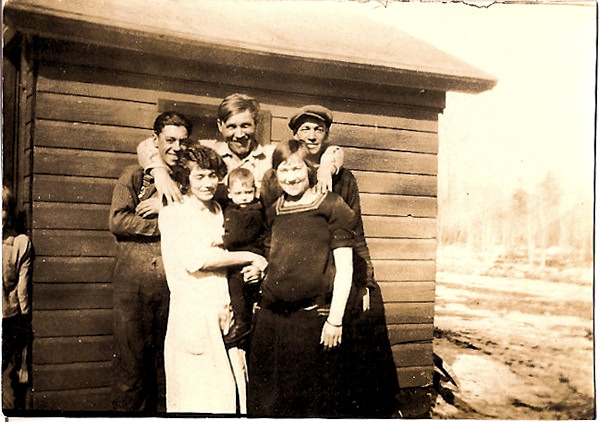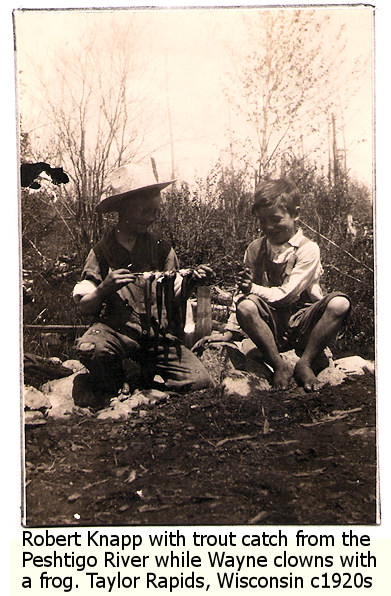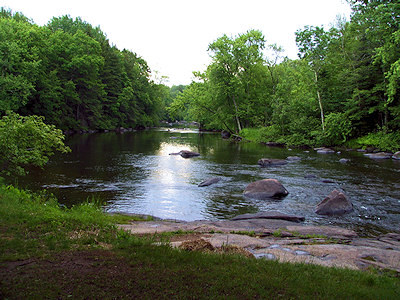The following story is told by Robert Knapp (1913-1994) of his first job in the logging camps of northern Wisconsin, around the Taylor Rapids – Goodman area in Marinette County. The events in this story happened in the winter of 1928.
Wisconsin, with it’s long cold winters, deep snows, and seemingly ever lasting icy conditions, implants a memory that I will never forget. It was the year nineteen hundred and twenty eight, I was fourteen years old, going to school. A neighbor who had been at the logging camp where one of my older brothers worked, brought us the word that I was needed to be his helper on a certain of where help was necessary. As I was the oldest of the three that were at home, naturally I was chosen to go.
It was a cold blustery day, a light snow was falling, and a crisp wind tossed the feathery stuff here and there. In some places it was already starting to form drifts. The person who had brought us the news, had just came from the camp, so the trail there was well broken, which made walking a little easier. My Mother had packed a few things for me to take along – tooth brush and paste, a clean shirt and pants, some extra socks and a couple of school books so that I could keep up on my school work. I’m sure that I never looked at one of the books after I left. I hated them!
It was a long walk for a fourteen year old, and I remember it well, the man had drawn out a sort of a map of the way there on a piece of paper. I knew the way very well as far as the river, but from there on it was strange to me. By the time I got to the river, it had snowed so hard that the fellows tracks were just about covered, this made travel a little more difficult. The river was frozen over, and there was about two feet of snow on the ice. I stopped there and looked at my map, sure enough I was on the right trail. Now if I could follow it, I wouldn’t have too much further to go.
I was sure happy to get away from school. I hated the teacher, he was a great big Norwegian. Very strict, with a very poor sense of humor. He seemed to enjoy showing his authority with us kids, especially me, as I was a little bigger than most of the others. He watched me like a cat would watch a mouse, and I would be reprimanded for the least act of wrong doing. He always managed to do this in front of the whole class, just on purpose to belittle me. At least that was the way I took it. I could have been wrong.
The map was well drawn, it had every little detail, it showed where a dead stub had fallen across the way that I had to climb over. Different objects that could be identified as I got closer to the camp. I had no trouble finding the way. By the time I arrived at the camp it was snowing so hard that I couldn’t see but only a few feet ahead of me. Great big flakes. I was sure glad when the camp came into view. The men’s camp was the first building, it was a long low building, with smoke rising from a stove pipe located about the center of the roof.
The heat from the pipe had melted the snow around it, but everything else was snow covered.
The snow had been carefully shoveled out around the door way, and I cautiously approached. I stomped the snow from my boots, and knocked on the door. Nobody answered so I opened the door and stepped inside. It smelled like tobacco smoke, but I didn’t mind that so bad as I also smoked at that time, although it was strictly against my Mothers orders. That curse-ed habit had caused me a gross amount of embarrassing moments. I had become addicted to it that summer, and I thought I would never be able to quit.
At first all I could see was beds. They were all well made, one above the other all along the walls of the building. I was just about to go on outside when the door opened and in came a man with a scotch cap and heavy coat on, he says, “What are you doing here kid? Why ain’t you in school where you belong.”
I told him how I had been asked to be there by a brother, who needed me as a helper on the job. Then he wanted to know who my brother was, and all about it. I was a little scared at first, because he looked like he could really get nasty if needs be.
I learned later that he was indeed the Bull Cook. He was the man who cut all of the fire wood and kept the fires burning day and night. He swept the floors and mopped when mopping was necessary. Each worker had to make his own bed and keep his little area neat as possible. The bull cook had everything else to take care of.
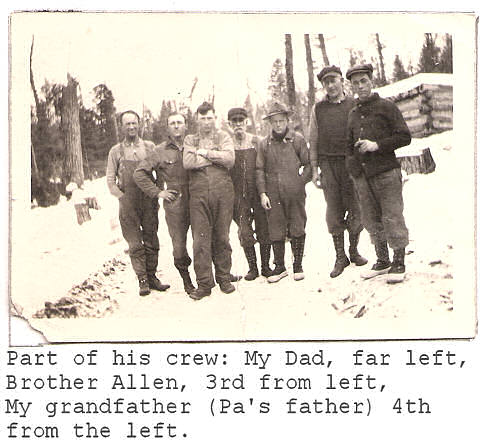 It wasn’t long till the crew of workers started to arrive at the men’s camp. What a commotion! There were big men and little men, old ones and young ones, homely ones and some good looking ones. Some wore long beards, while others were smooth shaven. Some seemed glad to see a kid in the camp, while others scowled at me and made me really feel out of place. Several of them patted me on the head and spoke in a kindly manner. I was sure relieved to see my own brother come through the door. He sure looked great to me, after looking at all of those strangers. By the way, I didn’t dare to smoke in his company either, he would be certain to tell my Mother, then I was sure that all hell would break loose.
It wasn’t long till the crew of workers started to arrive at the men’s camp. What a commotion! There were big men and little men, old ones and young ones, homely ones and some good looking ones. Some wore long beards, while others were smooth shaven. Some seemed glad to see a kid in the camp, while others scowled at me and made me really feel out of place. Several of them patted me on the head and spoke in a kindly manner. I was sure relieved to see my own brother come through the door. He sure looked great to me, after looking at all of those strangers. By the way, I didn’t dare to smoke in his company either, he would be certain to tell my Mother, then I was sure that all hell would break loose.
My brother advised me that he would not be needing my help, as the job he was supposed to have taken didn’t turn out to be worthwhile, so he had taken another, and this one didn’t have to have a helper. So I was left out.
It wasn’t long till I heard the supper bell ring, it was the cook pounding a hammer on a hunk of railroad iron that hung close to the kitchen door. The men had all washed up and had changed into clean shirts and pants. They filed into the cook house one right behind the other. It was really something to see, I went right along with the others, and took a seat at the big table, just like I was one of the crew. I never saw so much food in my life! I sat next to my brother, and I will never forget that wonderful meal. I was hungry as a bear, and everything tasted so good, I thought I’d never get full!
There were three big thirty-five foot tables with men seated on both sides, and on the ends. The men sat on the long benches, and generally had their own spot so sit.
There was no talking at the tables, and a large sign hanging in plain sight to all read those words. You could ask for food to be passed, but that was as far as talking was permitted.
The clatter of tin plates and knives and forks drowned out any other noises that may have been made at that time. Cookees were at each table checking on empty dishes, eager to refill if necessary. The cookees were the men in the kitchen that helped the cooks and also waited on tables when meal time needed. They wore white aprons, and were always dressed clean and neat, with sleeves rolled to the elbows. Pan after pan of steaming food was placed on these huge tables. Platters of sliced roast beef, mashed potatoes, string beans, brown meat gravy, with a large raisin pie every so far apart along those tables. It was a meal fit for a king, no doubt about it.
The kitchen crew ate after the crew finished and left the room. The cookees cleared off the long tables and it was their job to wash the dishes and stack them properly as the cook would advise.
I slept in the bunk house of the men’s camp that night. Then I was supposed to go on home the following day. This was the plan that my brother had layed out for me, but I was not planning on being bossed around by him any longer, and I had plans of my own.
The following morning I ate again in the big kitchen, or cook house, as it was known to be, we had hotcakes, fried sausage, warmed over potatoes (hash browns as they are called today), along with as many fried eggs as you could consume, and as much coffee as you wanted. There was also mush for those who didn’t care for the heavier foods.
Switching Camps
Instead of going home as I was told to, I got acquainted with a couple of older men who had quit working at that camp, and was leaving for another camp several miles from there. They were brothers-in-law, they lived at Taylor Rapids also, and not too far from where we lived. They asked me if I wanted to go with them to this other camp to look for work, I quickly agreed to go along, not realising the hazzards of a trip that we were to make.
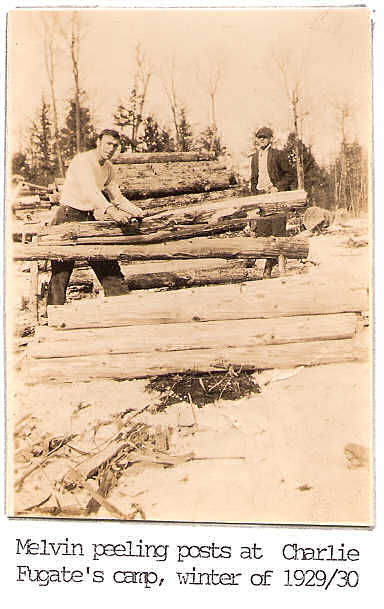 They fooled around camp for a long time, getting straightened out on their pay. By the time we were ready to leave it was late afternoon and beginning to show darkness. The snow storm had let up, but the snow was deep any way in most places. It was close to three thirty before we got started, and it was supposed to be twelve miles to this new camp. There were no buildings between where we were heading, and heavy snow fall from the day before had covered all signs of a trail, some wild wooded country had to be passed through, and wolves were known to be plentiful thereabouts.
They fooled around camp for a long time, getting straightened out on their pay. By the time we were ready to leave it was late afternoon and beginning to show darkness. The snow storm had let up, but the snow was deep any way in most places. It was close to three thirty before we got started, and it was supposed to be twelve miles to this new camp. There were no buildings between where we were heading, and heavy snow fall from the day before had covered all signs of a trail, some wild wooded country had to be passed through, and wolves were known to be plentiful thereabouts.
The going was not too bad till we got to where the trail hadn’t been broken, Some body had ridden a big horse that way, and the tracks were about three feet apart, they looked like post holes. The older fellows could make the long steps in good shape but when I tried to make them I would step in between the tracks. It was a terrible trip. The small pack I was carrying felt like it weighed far more than it really did. Finally after several miles of this kind of travel, I played out completely, and I fell down in the snow exhausted. Man, that felt so good! In a very short time I would have fallen sound to sleep, and of course I would have frozen to death right there!
Before I fell asleep I heard the older of the two men say to the other, “Come on Ovey, let the S.O.B. stay there, we got our own hides to look out for!”
Then I must have passed out, anyway the next thing I recall Ovey was there. He had came back to me and was trying to pull me to my feet by the arm. I heard him say, “Come on, Bob, you’ll freeze to death out here!”
My feet had gotten terribly cold, and we could hear the wolves. They sounded a lot closer to us than they really were. The men built up a real hot fire, and I stuck my booted feet up close to the blaze to warm them, my boots had leather tops and laced all the way to their tops very near to my knees. Finally the feet started to get warm, it was then that I realised that I would have to remove the boots quickly, but before I got them off, my feet had blistered. I had to finish the rest of our way on sore feet.
We managed to reach the next camp a little after midnight. We woke the head man at that camp. He happened to be a fellow we all knew. He advised us that his camp was full up, and there was no room for us to sleep there, but that we could sleep in one of the other buildings a short way from there.
It was empty, and had been for some time. It was as cold in there as it was outside. It had been a Men’s camp for a different crew, the bedding was still on the beds. We quickly pulled off our pants and crawled into one of the beds, I got in between those two, and it wasn’t long till we were all sound to sleep.
It seems that I had just nicely got to sleep when I was awakened to find that the others had already got up and were heading out the door. When I tried to put my overalls on the legs that had gotten wet the night before were frozen stiff, they were like trying to pull stove pipes over my feet.
I think it was one of the worst experiences I had ever had in my life.
After quite a struggle I got dressed and hobbled down to the other camp to find the other guys. They had just set down to breakfast. My feet were giving me a bad time. The cook at this camp was a woman, she told me to sit down and have some breakfast. There was fried ham and hotcakes and eggs. After getting our bellies filled, the man there told us of another camp up the road a ways that may be in need of help, so we traveled on to this next camp. Sure enough the boss was still at the camp, he told us that he could use one man, but not two. Well, the relatives didn’t want to separate, so I took the job, and it worked out pretty good for me.
The boss noticed that I was having a little trouble walking, my feet were giving me a bad time. I told him what the trouble was, and he ordered me to go in and have the cook take a look at them and see what he could do for me. The cook was a big jolly good natured man, he made me feel right to home, I took a liking to him right away.
When I pulled off my socks he said, “Oh, you poor kid, you must have run awful fast to get your feet that hot!!” Then he laughed.
He had a jar of Carona Woolfat, stuff that is used on cuts that happen to horses. He said that was the only thing he had that might possibly do me some good. Any way after he applied that to my feet, they seemed to quit hurting. Whether it was my imagination, or perhaps that stuff was really good, I don’t know.
He called the boss over and told him to leave me in camp that day, and see if I wouldn’t feel a lot better the next day. The boss said that it would be alright for me to stay off my feet for at least a day, so I layed on my bunk and visited with the cook till he got bored and went to reading a book he had. To my great surprise the next morning I felt real good, my feet didn’t bother me hardly at all, and I told the boss I figured I was ready to do a days work for him.
The crew consisted of only about twelve men counting the cook. Two teamsters that hauled the logs from the woods to the landing where they had to be loaded on to flat cars, and hauled to the town of Goodman by train. There were two sets of sawyers, they fell the trees and cut them into logs, two guys that did the skidding of the logs from where they were cut to where they were loaded on to sleighs. Two swampers, they were the ones that cleared away the under brush so that the sawyers could fall the trees. And myself.
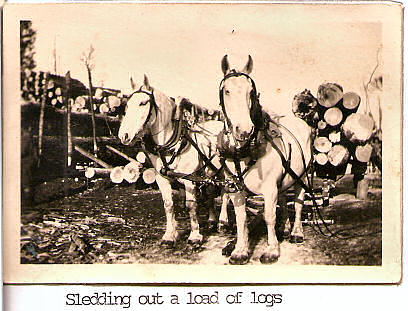 My job was Road Monkey. I had to follow the teams to and from the woods to the landing, and keep the horse manure chopped out of the sleigh tracks so that the sleighs with their heavy loads of logs would not stick when they were dragged over that stuff. It was about a two mile walk, and I probably made at least six trips a day.
My job was Road Monkey. I had to follow the teams to and from the woods to the landing, and keep the horse manure chopped out of the sleigh tracks so that the sleighs with their heavy loads of logs would not stick when they were dragged over that stuff. It was about a two mile walk, and I probably made at least six trips a day.
I carried an axe and a shovel, for this stuff would freeze to the icy tracks about as soon as it fell. In spots where the team had stopped to rest, it would pile up pretty good.
The pay was two dollars a day, and board and room. We had to pay extra on Sunday, because nobody worked, but we all had to eat. At this camp there was an old one hole outside toilet, the stuff had piled up so high in it that it was just about impossible to use, so I was elected to chop the stuff down, and make it usable, and for that I was to get free eats on Sunday as long as I worked there. I remember so well how those blasted chips would hit me in the face, but I was only a kid, and I didn’t mind.
I worked there for thirty days, and when I got finished I had sixty dollars in my pocket. The man paid me in cash!
Not All Camps Are Welcoming
I had done so well that I figured I’d go on up the track aways and try to get a job there. I was told that another camp was working perhaps five miles on. I arrived at this new camp just a little before dark, this was on a Sunday evening, every one had gone to town except the cook and the boss of the outfit, and of course the kitchen crew. The men had gone to town on the previous Friday evening to spend their money and have a little fun.
I asked the boss for a job. He wanted to know why and how come a kid my age was applying for work in the woods and not in school. I told him where I had been working and he knew the boss real well where I had been. Anyway he told me to have supper with them and he would see what could be done in the morning. I ate supper in the kitchen with the cook and his crew. After the meal was finished the boss went to the bunk-house along with me to locate my sleeping quarters. He seemed like a friendly enough person.
I hadn’t quite got to sleep when there was a terrible commotion just outside the building. The rattle of trace chains, and the loud voices of several men, warned me that the crew had arrived from their week end spree. Most of them were still very much still under the influence of whiskey as they stumbled out of the big sleigh and into the building.
The Teamster unhitched the sweating team and after putting them away, joined the others in the brawl. Some of them were singing, while others were cursing and yellÂing to the top of their voices. Somebody lit a couple of coal oil lamps that sat on a table in the center of the room. I watched from my top bunk as they argued and tore into one another. Some one threw his boot at another, and the thing hit me right on the nose, I bled like a stuck hog, and just about that time the boss entered through the open door!
“What the hell is going on in here!” he boomed. He had a very loud voice, and it could be heard for some distance. “You fellows have had your fun, now I want you all to settle down, and cut out this rough house stuff, do you hear?!”
Well, after that they did quiet down a little, then the boss noticed my bloody and bleeding nose, he asked me what had happened. I told him I had bumped my nose getting into the top bunk. At the same time one of the men hollered, “That ain’t so boss! Jim there threw a boot at old Tom and hit the kid there!”
Well, that started the fight all over again. I had never seen the beat of it. The poor boss finally left. The men were completely out of control. This kind of action went on for about an hour, then they all climbed into their beds and fell asleep.
What a relief! I didn’t sleep much the rest of the night, guy’s were snoring and jabbering in their sleep, besides my nose didn’t feel too good either.
The next morning I had a black eye, and my fool nose was swelled out of shape! I didn’t know what to do, I hated to face the kitchen crew looking like that, but I had no choice. It was eather face them or go hungry, and I didn’t want to do that.
After breakfast that morning, I searched out the boss. I told him that I didn’t think I’d better stick around for the job. I wasn’t too happy with the actions of the crew that I would probably have to work with any way. He assured me that he did not blame me, but that he did have a good crew, and it was only because of the excessive drinking that had taken place over that week end. I had already decided to leave so I thanked him for the meals, and bid him goodbye. It all happened so fast that I didn’t waste any time getting as far from that camp as possible.
As I think back, I must have been a sorry looking specimen as I followed that lonely sleigh road that led to the railroad track, where, if possible, I might be able to get a ride out on the logging train.
I heard the whistle blow, and knew it would be chugging along in a short time. I hurried along to reach the top of a long uphill grade, where I knew the train would be slowed down to where I could jump on. Sure enough I had just made it in good time, as I reached for a hand hold on the side of the big engine, a hand reached into mine and helped pull me up into the cab. I was really very much surprised to see who it was that had helped me get aboard. It was the grinning face of dear old Ovey, the guy that had saved me from freezing to death on that long walk.
He told me that he and his brother-in-law had taken a job up the track a few miles, but that he had chopped himself in the leg with an axe, and the thing wasn’t healing fast enough. So he was heading for Goodman where it could be properly taken care of by the company doctor. His leg had become infected, and there was no way of overcoming the difficulty at the camp. I had to show him my sixty bucks, I was happy as a clam at high tide. The train stopped at another camp further down the line to pick up more logs. I got off there and walked the other six miles home.
I dreaded to have to go back to school. You will never know how much I hated the very thought of it! My Mother had been terribly worried about me when she learned that I had not taken the job with my brother, and then didn’t show up at home to continue my school. But she was real happy to see that I was safe and sound at least, and I’m sure that the sixty dollars was well spent.
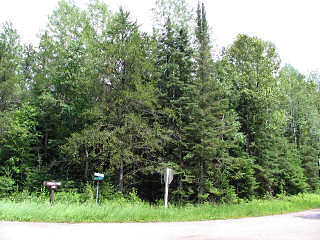
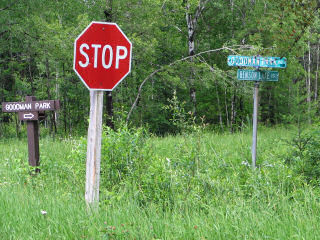

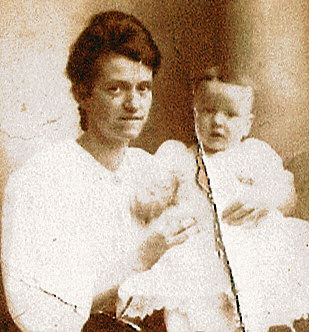 It’s really tough when much of the information you have on an ancestor is hearsay, gossip, rumors, and terrible family stories. But that’s all we have right now. We’re looking for more and we need your help.
It’s really tough when much of the information you have on an ancestor is hearsay, gossip, rumors, and terrible family stories. But that’s all we have right now. We’re looking for more and we need your help. It wasn’t long till the crew of workers started to arrive at the men’s camp. What a commotion! There were big men and little men, old ones and young ones, homely ones and some good looking ones. Some wore long beards, while others were smooth shaven. Some seemed glad to see a kid in the camp, while others scowled at me and made me really feel out of place. Several of them patted me on the head and spoke in a kindly manner. I was sure relieved to see my own brother come through the door. He sure looked great to me, after looking at all of those strangers. By the way, I didn’t dare to smoke in his company either, he would be certain to tell my Mother, then I was sure that all hell would break loose.
It wasn’t long till the crew of workers started to arrive at the men’s camp. What a commotion! There were big men and little men, old ones and young ones, homely ones and some good looking ones. Some wore long beards, while others were smooth shaven. Some seemed glad to see a kid in the camp, while others scowled at me and made me really feel out of place. Several of them patted me on the head and spoke in a kindly manner. I was sure relieved to see my own brother come through the door. He sure looked great to me, after looking at all of those strangers. By the way, I didn’t dare to smoke in his company either, he would be certain to tell my Mother, then I was sure that all hell would break loose. They fooled around camp for a long time, getting straightened out on their pay. By the time we were ready to leave it was late afternoon and beginning to show darkness. The snow storm had let up, but the snow was deep any way in most places. It was close to three thirty before we got started, and it was supposed to be twelve miles to this new camp. There were no buildings between where we were heading, and heavy snow fall from the day before had covered all signs of a trail, some wild wooded country had to be passed through, and wolves were known to be plentiful thereabouts.
They fooled around camp for a long time, getting straightened out on their pay. By the time we were ready to leave it was late afternoon and beginning to show darkness. The snow storm had let up, but the snow was deep any way in most places. It was close to three thirty before we got started, and it was supposed to be twelve miles to this new camp. There were no buildings between where we were heading, and heavy snow fall from the day before had covered all signs of a trail, some wild wooded country had to be passed through, and wolves were known to be plentiful thereabouts. My job was Road Monkey. I had to follow the teams to and from the woods to the landing, and keep the horse manure chopped out of the sleigh tracks so that the sleighs with their heavy loads of logs would not stick when they were dragged over that stuff. It was about a two mile walk, and I probably made at least six trips a day.
My job was Road Monkey. I had to follow the teams to and from the woods to the landing, and keep the horse manure chopped out of the sleigh tracks so that the sleighs with their heavy loads of logs would not stick when they were dragged over that stuff. It was about a two mile walk, and I probably made at least six trips a day.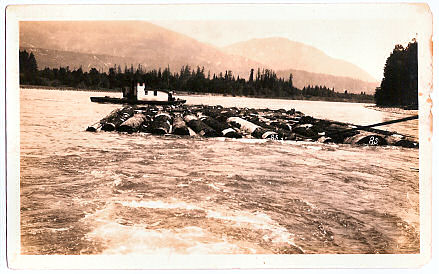 During the early thirties, I took a job cooking on a fifty foot tug boat, named The Skagit Chief. Captain Charles Elwell was the pilot. It was he who had got me the job. He was also my wife’s father. We towed logs from the upper Skagit River, near Marblemount, down river as far as Mount Vernon, Washington.
During the early thirties, I took a job cooking on a fifty foot tug boat, named The Skagit Chief. Captain Charles Elwell was the pilot. It was he who had got me the job. He was also my wife’s father. We towed logs from the upper Skagit River, near Marblemount, down river as far as Mount Vernon, Washington. Boom Sticks, as they were called, were extra long logs with three inch holes bored in each end. They were held together with boom were chains. The heavy boom chains were perhaps eight or ten feet in length. They had a ring in one end and a bar in the other. The bar went through the hole in the stick, looping another, and back through the ring.
Boom Sticks, as they were called, were extra long logs with three inch holes bored in each end. They were held together with boom were chains. The heavy boom chains were perhaps eight or ten feet in length. They had a ring in one end and a bar in the other. The bar went through the hole in the stick, looping another, and back through the ring.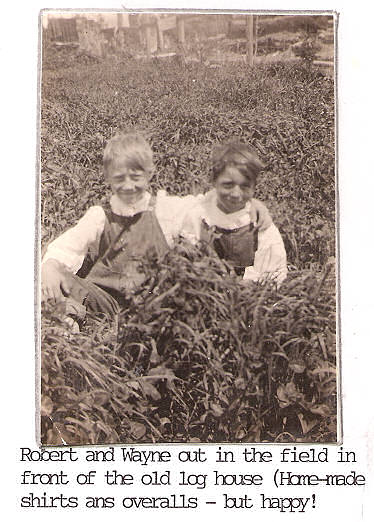 When my brother Wayne and I were kids, growing up in Wisconsin, we had lots of opportunities to explore the country sides. The Peshtigo River ran just a short way from our house. During summer months we fished this river, and in winter times, we played on the ice.
When my brother Wayne and I were kids, growing up in Wisconsin, we had lots of opportunities to explore the country sides. The Peshtigo River ran just a short way from our house. During summer months we fished this river, and in winter times, we played on the ice.